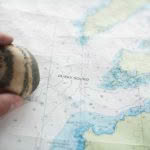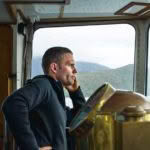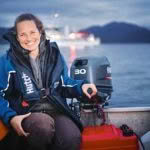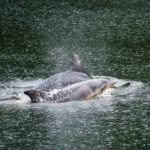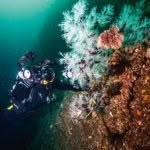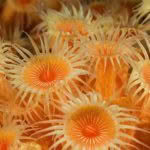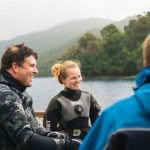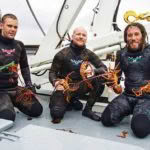Passionate environmentalists involve passengers in Fiordland conservation work via ecotourism venture Pure Salt
An entrepreneurial couple have built a Fiordland-based business that takes New Zealanders out of their daily lives and back in time.
Words: Chris Van Ryn Photos: Chris Van Ryn & Fez Vercauteren
So remote is the south-west corner of the South Island — home to an archipelago of 700 islands — that there are moments when it’s possible to feel entirely alone. And when the wild beauty, enhanced by mirror-glass waters or a sultry mist drifting over white-capped mountains, elevates the soul and sends it soaring, gravity seems to fall away.
The U-shaped valleys and mountain ridges of Fiordland, truncated by glaciers, form a land and seascape unchanged for centuries. Captain James Cook saw it this way when he sought refuge here in 1773 after 123 days battling storms in the icy Southern Ocean.
With a beauty and grandeur hidden far from the usual tourist routes, this is as pristine an environment as anywhere in the world. But there is a problem. Seen from a distance, the bush is a canopy of virgin variegated greens — silver beech, tõtara, rimu and miro. On land, there is the subtropical smell of regeneration: damp earth and composting vegetation. But there’s also an eerie silence vastly different from Cook’s time.
- Conservation plays a key role in the activities of Pure Salt. Volunteers can join a charter group and assist DOC in establishing a network of traps and tracking tunnels across the islands.
- Maria Kuster and Sean Ellis, owners and operators of Pure Salt Charters, are each equally at home steering the MV Flightless or handling the outboard motor on the small rubber raft.
- Handling the outboard motor on the small rubber raft.
The birdsong, he reported, was “deafening”. But rats, stoats, deer and possum have since ravaged the forest and devastated the bird life. Slipping through these mercurial waters — at one time calm, the next white-tipped by wind — sails Flightless, a 27-metre ex-Navy expedition vessel with international survey and safety equipment, water-maker, diesel stove, air-conditioning, three bathrooms, and a huge back deck with dining table for communal meals of venison or crayfish or pāua, the seafood caught within metres of the boat.
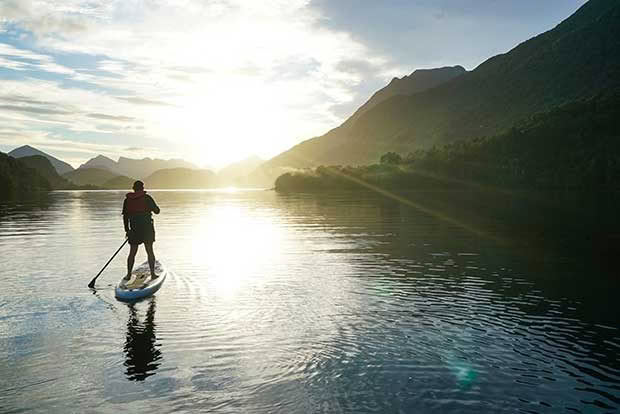
A paddle-boarder heads into the sunset for a solitary paddle, an opportunity for tranquil reflection.
Flightless — only slightly smaller than Cook’s expedition ship with its crew of 70, and named after its original Navy moniker, Moa — is home to Sean Ellis (35) and Maria Kuster (34). On its decks, this plucky entrepreneurial couple not only built a charter business, Pure Salt, but also developed and honed their values, forging a passion for conservation, people and this remote corner of the South Island.
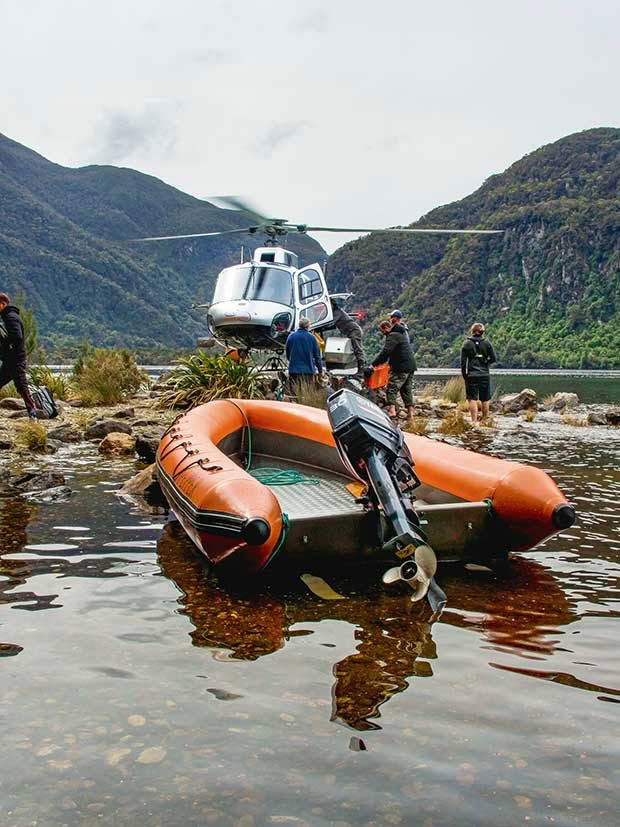
Supper Cove, with new supplies and guests arriving from Te Anau.
Born in East Germany six years before the wall came down, Maria excelled at school. Her parents had expectations. “In Germany, things are structured. I was headed for medicine or law. For me, to jump off the wagon and do what felt good didn’t make a lot of sense.” At 19, she headed overseas to improve her English. While friends went to the States, Maria decided on New Zealand. When people said, “Go to Auckland,” she went to Christchurch. It was the start of following her own way, a trajectory she maintains to this day. It guides her life, loves and business.
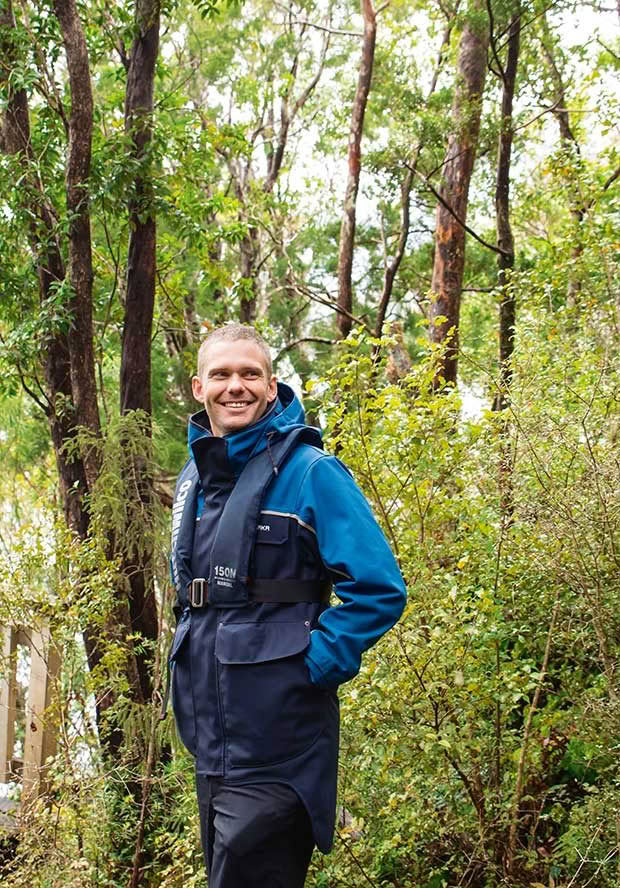
She planned to stay for eight months. That was 15 years ago. She fell in love. With New Zealand, the South Island, diving, remote corners, and Sean Ellis. In that order. The South Island has always been home for Sean. He grew up one of five, a shy kid who was home-schooled. “I studied in the kitchen and was used to pots and pans clanging away,” he laughs. Much of his childhood was spent on the water with his bare feet planted firmly on the deck. “I grew up on boats. As a toddler, Mum would tie me to the railing so I could trot around the deck.” His brother fell in once. His father leant over the railing and said calmly, “Let’s wait for him to come back up before we jump in. No point until we see where he is.” At 14, Sean went to college. The transition was hard. “I love to get out and do stuff. For me, it’s about getting my hands dirty.”
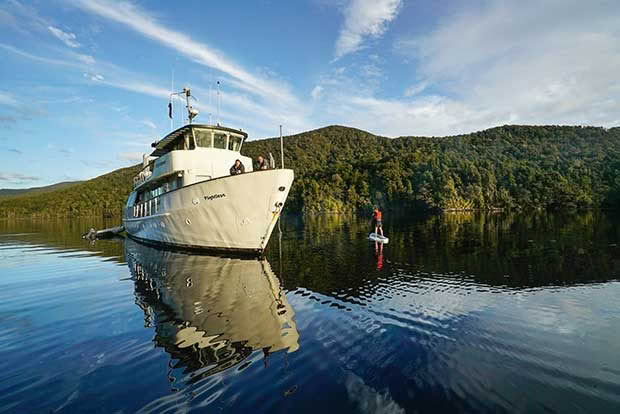
There was no single step that led Sean and Maria to Flightless and Pure Salt. “It wasn’t planned,” says Maria. “We were individually pursuing our passions.” She completed divemaster and instructor courses, and then got her skipper’s ticket; Sean was pursuing similar qualifications. After they met, they both became commercial divers and studied marine engineering in Nelson. Later, they worked in engineering workshops, gaining hands-on experience. “If you’re driving boats, you want to know how they work,” says Maria.
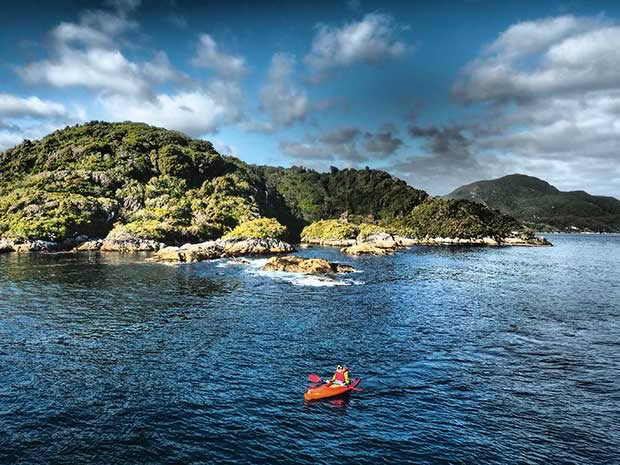
On the rare occasions when they’re not on Flightless, they combine their engineering and diving skills working in underwater construction: maintaining hydro dams, undertaking biosecurity inspections, and videoing equipment to gauge deterioration. Sean appreciates what Maria brings to the business. “I wouldn’t be here if it wasn’t for her. She set up the website, does the marketing and organizing and brings everything together.” A couple for 10 years, they say their relationship has been built on honesty. “That’s what brought us together. When you’re honest, there’s no room for ego. It’s a waste of time.”
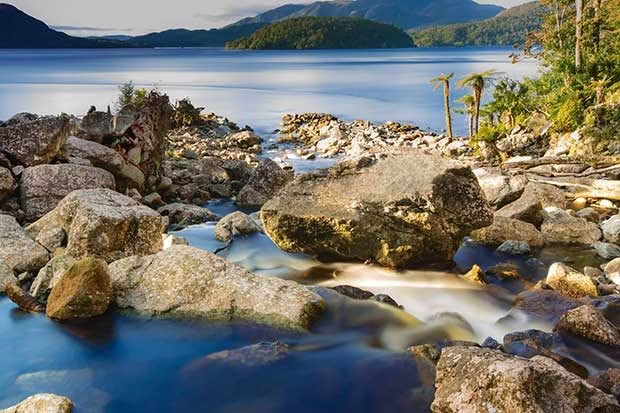
They don’t see Pure Salt as tourism. “We are dealing with New Zealanders, so the mentality is locals checking out their backyard,” says Maria. Together, they provide a mix of charters: fishing, hunting, diving, and all-women groups as well as specialist excursions focusing on photography or conservation, where volunteers assist in pest eradication.“We are not here to plunder the place,” says Sean. “It’s about raising awareness and being inspired and taking ideas home, looking after New Zealand.”
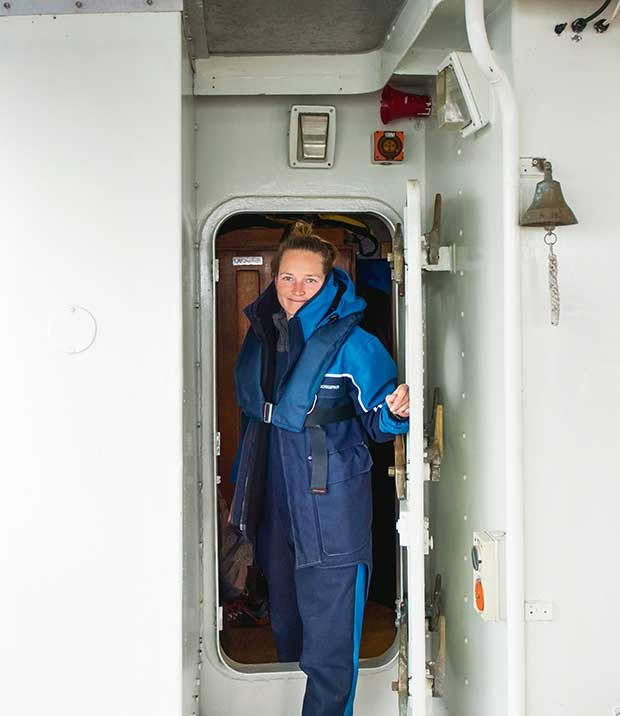
The philosophy aligns with New Zealand’s goal to be predator-free by 2050. Pure Salt sponsors DOC in its pest-control attempts in Fiordland. “Rats and stoats can swim up to two kilometres. They island hop. We’re constantly monitoring and setting traps,” says Lindsay Wilson, DOC’s principal ranger (biodiversity) in Fiordland, running his hand over a map of Indian Island, showing a grid of traps. After the first day of setting taps, a rat is caught. Everyone onboard is jubilant. Later the rat is used as fish bait. There have been challenges for Pure Salt and Flightless.
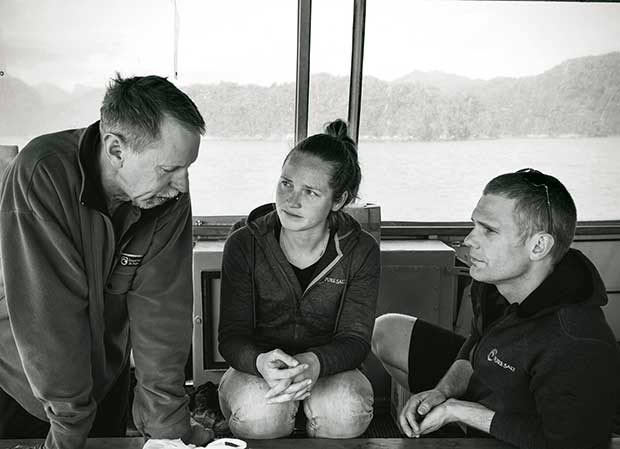
DOC’s Lindsay Wilson discusses a strategy for setting traps on Indian Island with Sean and Maria.
“We once nearly lost a propeller,” recounts Maria. “That’s a disaster in these waters.” “We also had some business offers that almost went ahead. But we looked at each other and said, ‘You know what? This doesn’t feel right. It’s taking too much twisting of ourselves.’ So we pulled out.” This is life, they say. Don’t get stuck on things. Deal with it. Sean looks through the window at the prow of Flightless as it hums through the early morning water. Destination: Supper Cove, Flightless’ point of origin and departure. The wind is sharpened by snow, and the granite mountains softened with white. Plumes of light rain drift across the layered surface: fresh water for two metres, then the darker saltwater, reaching down 100 metres. But then the sun opens the day, and flashes of light sparkle on the surface like freshly poured spumante.
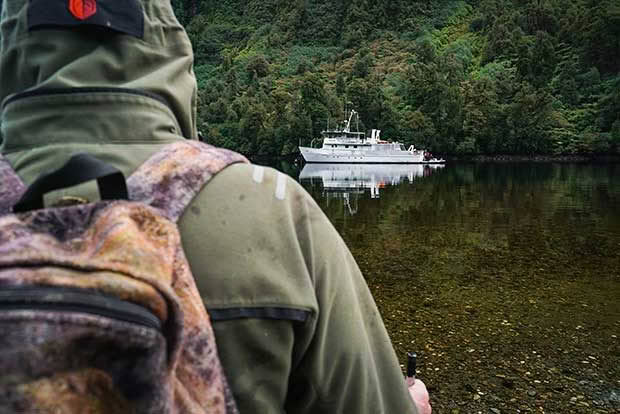
It’s the end of one charter, the new about to begin. Maria, Sean and crew — Brad Lawson and Anna Shanks — begin dashing in and out of cabins and clambering up ladders, preparing Flightless for the next intake. “The most difficult thing when you come to the end of a charter is letting go of people,” says Maria. “You have a week together. No email, mobiles or social media. It’s all about each other. You bond.”
The thrum of the ship’s generator can be felt on deck where the outgoing party are assembled. Someone walks over and leans on the railing, staring into the water at the little orange rubber raft that bobs behind the boat, leaving a wake of white foam.
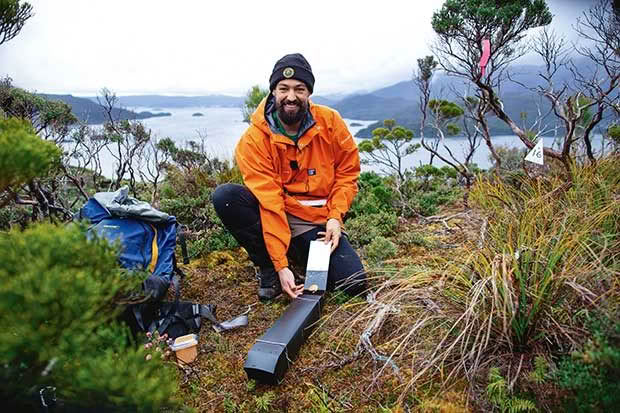
Sam Gibson sets a tracking tunnel for monitoring the island’s rat population. The rats eat small animals and plant material, including the adults, eggs and chicks of many rare birds.
In the distance, the beehive-shaped silhouetted mountains have turned monochrome. Something is coming to an end. No one quite knows how to wrap words around it. Soon, someone will try. The whirring and thumping of rotating blades echo around the mountains, and the downdraft whips the water in the cove to a frenzy, thrusting out a ripple of concentric circles. The helicopter from Te Anau — with the new group — arrives.
Pure Salt, Flightless and Fiordland is a place where people share their “stories”. If they want — where they have come from and where they are going. No one minds. Somehow this place, this ship, this rugged piece of windswept nature, this experience outside the everyday, levels the field and breaks through barriers.
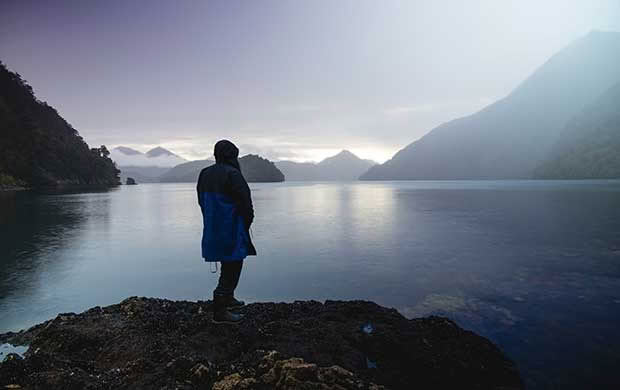
People open up and share unpolished anecdotes of life. There’s dreadlocked, grinning Rusty, who’s as wild and adventurous as Fiordland itself: “I saw it on Facebook, so I just came.” And 85-year-old Max, whose wife faced an operation he thought she may not survive (she did, successfully), which made him realize that life is startlingly fragile, each moment pure and precious.
And his sons, Roger and Craig, who manage to squeeze a week away from work to bond with family, aware five decades of life’s moments have passed in seconds and fewer remain. And their brother Grant, who leans on the shoulder of anyone nearby for help. No one says a word, but everyone has a shoulder ready.
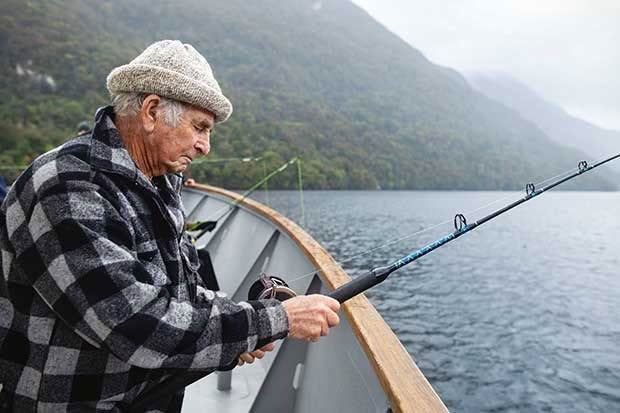
Max Hornblow (above) fishes in waters that provide a plentiful supply of blue cod, groper (hāpuka), tarakihi, gurnard, kingfish, tuna, ling, bluenose, flounder, mussels, crayfish, scallops, paua, cockles and kina.
And everyone stares jaw-dropped, as videographer Fez Vercauteren, seduced by the environment and loaded with camera gear, sets off to thrash his way up a mountain on Indian Island for that “I’ll never forgive myself if I don’t get it” shot. And then there’s Anna, the “throw-it-together” chef, who is 23 and says she thinks the key to life is an open mind, and that life is richer when viewed through the lens of others, as well as your own. And the DOC “huge bowls of muesli for breakfast” mountain men with their passion for conservation and trapping pests, which inspires everyone because they all want to hear, once again, the kākā call and the tūī warble and the robin chirrup — the “deafening” sound that Cook heard.
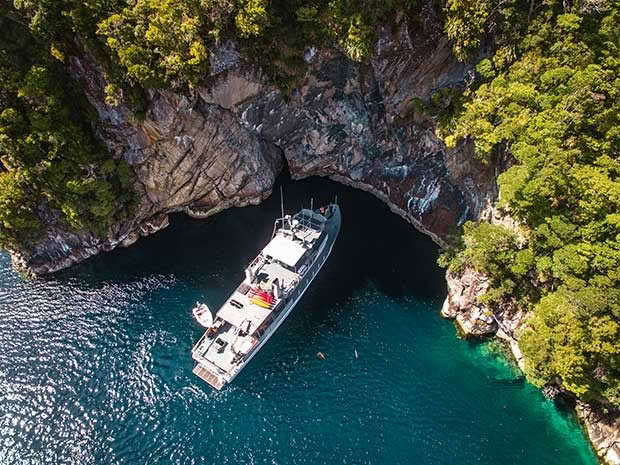
On deck, the departing group prepare to leave. Roger stands. He’s about to speak. Maria and Sean lean against the railing smiling, relaxed, despite the rush. They’ve been here before. They have an inkling of what’s to come. This is the moment, the reason they do all this.
“Can I just say…” Roger clears his throat. Suddenly, he’s speaking for everybody. “…what a fantastic, special time we’ve had. This,” gesturing toward the mountains, “was on Dad’s bucket list. And everyone knows my brother is unwell. On this trip, he really opened up.”
- In the dark waters of Fiordland, Antipathella fiordensis (black coral, which is, in fact, white) grows at depths of 15 to 50 metres.
- Sean takes Rusty Varcoe and Fez Vercauteren diving for lobsters.
He smiles, looks at the group, then at Sean and Maria. “And,” grinning now, “he’s eaten more than I’ve seen in a long time.” Someone behind says, “That’s because of Brad’s caramelized pāua. Fresh from the ocean floor.” Everyone laughs. Sean kisses Maria on the forehead. People hug and leave. They step out of Fiordland and back into their lives. “We’ll keep in touch,” they say. The story of others. This is the real story of Maria and Sean; the important story. They wouldn’t want it any other way.
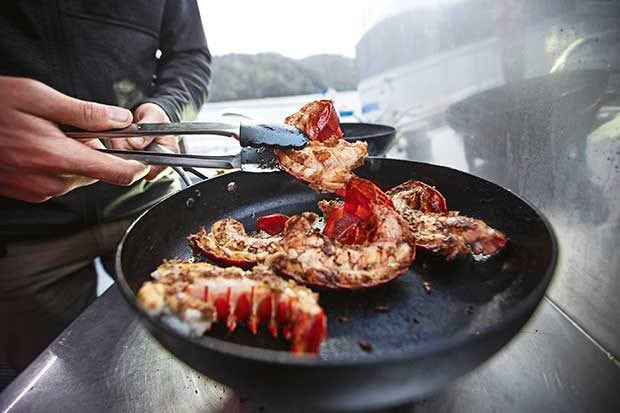
The crustaceans go from ocean to frypan to communal dinner table in less than an hour.
PURE SALT
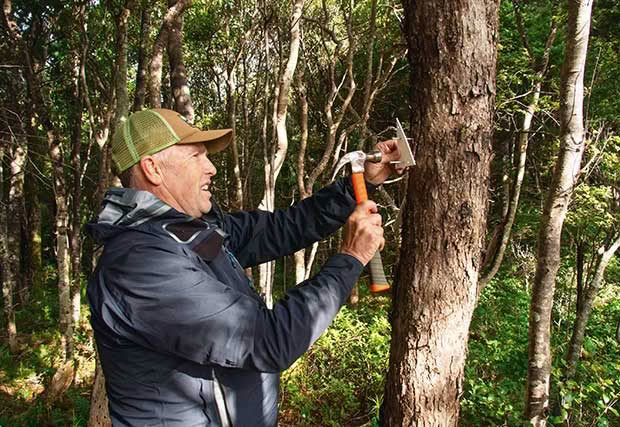
Craig Hornblow.
Pure Salt is raising funds to install the final 160 traps on Indian Island, part of the overarching DOC Tamatea (Māori for Dusky Sound) project . DOC’s vision is for Tamatea to become one of the most intact ecosystems on the planet, and New Zealand’s largest “bio bank” — a sustainable source of endangered native species that can be relocated to pest-free areas elsewhere in the country.
THIS SUMMER WE’LL BE…
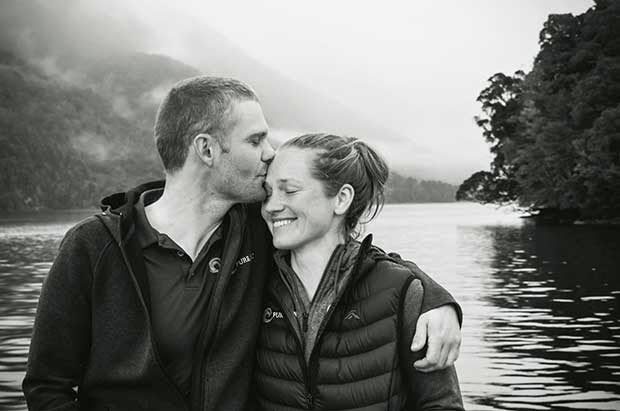
Reading: Thank You: Chapter One by Daniel Flynn. It’s about a non-profit organization that had the idea of ending world poverty. It’s incredible what a couple of people with an idea can do. And it proves that little changes in daily routines make a huge difference.
Cooking: Fresh pāua. We tenderize the pāua — a simple technique that involves splitting the muscle open and leaving them to soak in a salt-water brine overnight. The next day, we cut them into steaks a centimetre thick, lightly flour them and pop them in a hot pan with butter and maybe some ginger or garlic and black pepper. The steaks are fried quickly and, towards the end, we add a splash of soy sauce, which evaporates and caramelizes nicely.”
Listening to: “We listen to other people’s playlists. You learn a lot about someone, and it exposes us to other sorts of music we may not choose to listen to.”
Love this story? Subscribe now!
 This article first appeared in NZ Life & Leisure Magazine.
This article first appeared in NZ Life & Leisure Magazine.
